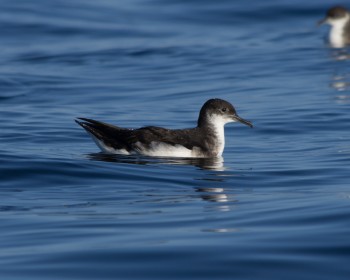Chris Tyson (Graduate Group in Ecology, University of California, Davis, USA) and colleagues have published in the journal Animal Behaviour showing that Manx Shearwater Puffinus puffinus pairs coordinate dual-foraging behaviour during chick rearing.
The paper’s abstract follows:
“In long-lived species, care-giving parents are expected to balance their own condition with that of their offspring. Many species of seabirds display a unique behavioural adaptation for managing these conflicting demands known as dual foraging, in which long trips, largely for self-maintenance, are alternated with short trips, which are primarily for offspring care. While dual foraging is a widely studied behaviour, it entails a complication that is seldom discussed: if parents independently employ a dual-foraging strategy, chicks might be abandoned for extended periods when the long trips of both partners coincide. Whether partners coordinate their dual-foraging strategies, however, is largely unknown. To investigate this possibility, we used radiofrequency identification readers coupled with passive integrated transponder tags to record extended sequences of foraging trips for breeding Manx shearwaters, Puffinus puffinus. Our results show a pattern of foraging trips that indicates a high level of coordination between parents, which facilitates consistent provisioning. Additionally, we show that the propensity for pairs to coordinate declines across the chick-rearing period. Given the potential costs of not coordinating, we expect this behaviour to be widely spread among dual-foraging species.”
 A Manx Shearwater at sea, photograph by Nathan Fletcher
A Manx Shearwater at sea, photograph by Nathan Fletcher
Reference:
Tyson, C., Kirk, H., Fayet, A., Van Loon, E.E., Shoji, A., Dean, B., Perrins, C., Freeman, R. & Guilford, T. 2017. Coordinated provisioning in a dual-foraging pelagic seabird. Animal Behaviour 132: 73-79.
John Cooper, ACAP Information Officer, 11 September 2017

 English
English  Français
Français  Español
Español